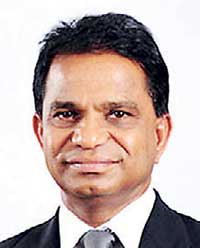20 Sep 2017 - {{hitsCtrl.values.hits}}
In a shocking turn of events, Power and Energy Ministry Secretary Dr. Suren Batagoda yesterday insisted that Korean industrial giant Samsung has not qualified for the 300MW Liquified Natural Gas (LNG) power plant tender in Kerewalapitiya, after being queried over claims that Samsung’s bid—the highest—would have resulted in a Rs.220 billion loss to the country.

“Samsung’s tender was not even opened. We got eight tenders, of which only five passed the first commercial evaluation stage and then the technical evaluation stage and came to the financial evaluation stage. Samsung is not in these five tenders, and all five of these tenders have been opened and submitted to the Ceylon Electricity Board (CEB),” Dr. Batagoda told Mirror Business.
However, last month, he was quoted in our sister newspaper the Sunday Times as saying that only Samsung had qualified past the technical evaluation stage and was under consideration; a state of affairs which was also corroborated by state media reports.
Dr. Batagoda is part of the Standing Cabinet Approved Procurement Committee (SCAPC) which opens tenders that pass the technical evaluation of the Technical Evaluation Committee, in order to ensure transparency in procurement.
Two of the members of SCAPC, including its chairman, resigned last month.
A source close to the tender selection process told Mirror Business that the newly reconstituted SCAPC, upon intervention from Prime Minister Ranil Wickremesinghe, this Monday opened five other tenders, now bringing the six parties—including Samsung—which originally passed technical evaluation into competition.
According to the source, Samsung had not submitted the cost per unit of power generation for financial evaluation.
However, based on the Samsung’s data pertaining to the commercial and technical evaluations, the cost would be Rs.21 per unit.
The difference between Samsung’s bid, and the lowest bid of Rs. 14.98 per unit based on a plant factor of around 80 percent, translates to a Rs. 11 billion annual loss, or a Rs. 220 billion loss for the country for the duration of the 20-year power generation agreement.
Dr. Batagoda claimed that he does not know of the burden Samsung’s selection for the project would have placed on Sri Lanka, since the document was not opened.
“Samsung may have even placed the lowest bid, but we won’t know, because we didn’t open their tender document,” he said.
Sojitz Corporation, which owns the Kelanitissa AES plant and Shikoku Electric Power Co. Inc. which are both Japanese companies, partnered with the local conglomerate Aitken Spence PLC which operates a thermal power plant, to place a bid at Rs. 16.798 per unit.
CGNPC International Ltd, a subsidiary of China General Nuclear Power Group, placed a bid at Rs. 18.099 per unit.
China’s Global Concord Group Limited, and the local based Windforce (Pvt) Ltd and RENEWGEN (Pvt) Ltd. have jointly placed a bid at Rs. 15.976 per unit.
Lakdanavi Ltd, a power plant construction and operation subsidiary of LTL Holdings (Pvt) Ltd, which in turn is a subsidiary of the state-owned Ceylon Electricity Board, placed a bid at Rs. 14.989 per unit.
Singapore-based Summit Power International Pte. Ltd., General Electric (Switzerland) GmbH, and Korea’s DAELIM Energy Co. Ltd placed their bid at Rs. 16.31 per unit.
The finalized bid has to conform to the latest Least Cost Long Term Generation Expansion Plan (LCLTGEP) which was approved by the Public Utilities Commission of Sri Lanka (PUCSL) in July, and the PUCSL also has the last say on a bid finalized by the CEB, and the rejection of a bid would result in a new tender process.
PUCSL Director General Damitha Kumarasinghe, upon approving the LCLTGEP, said that the CEB has to fast track the Kerawalapitiya power plant tender process to commission the project by 2019, in order to avert a severe power shortage in the country.
The 300MW Kerewalapitiya LNG Power Plant is a 20-year build, own, operate and transfer project, with the PUCSL calling for LNG imports until the Mannar Gas fields can be commercialized by around 2023.
The CEB had attempted to get a coal-heavy LCLTGEP approved, by misrepresenting world LNG prices to make the highly environmentally damaging coal look like a cheaper option, but following critical analysis by experts during a public consultancy session, the PUCSL had reprimanded the CEB for its duplicity and removed coal options from the LCLTGEP. (CW)
05 Nov 2024 7 hours ago
05 Nov 2024 9 hours ago
05 Nov 2024 9 hours ago
05 Nov 2024 05 Nov 2024
05 Nov 2024 05 Nov 2024